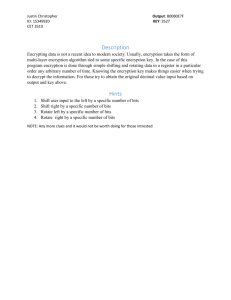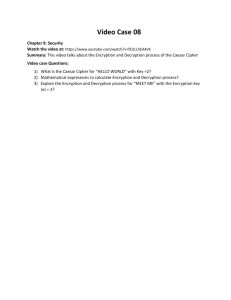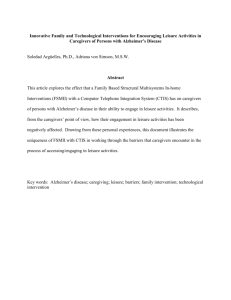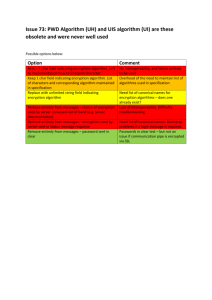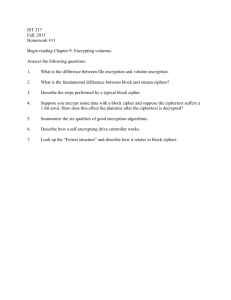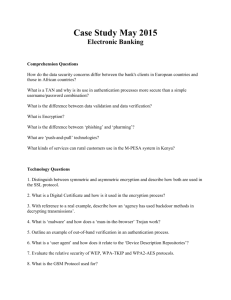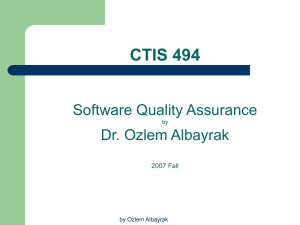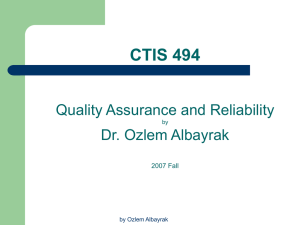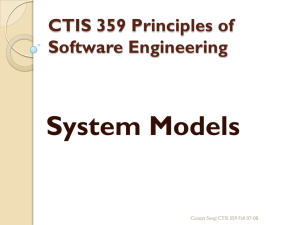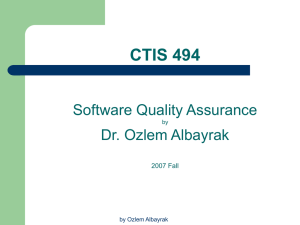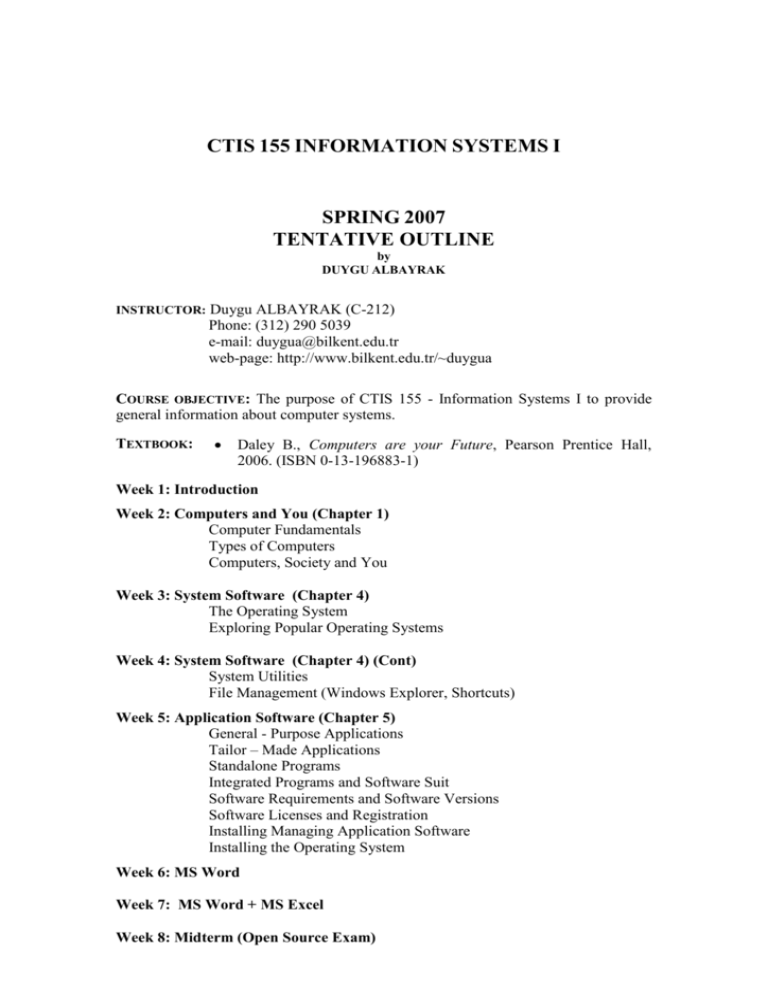
CTIS 155 INFORMATION SYSTEMS I
SPRING 2007
TENTATIVE OUTLINE
by
DUYGU ALBAYRAK
INSTRUCTOR:
Duygu ALBAYRAK (C-212)
Phone: (312) 290 5039
e-mail: duygua@bilkent.edu.tr
web-page: http://www.bilkent.edu.tr/~duygua
COURSE OBJECTIVE: The purpose of CTIS 155 - Information Systems I to provide
general information about computer systems.
TEXTBOOK:
Daley B., Computers are your Future, Pearson Prentice Hall,
2006. (ISBN 0-13-196883-1)
Week 1: Introduction
Week 2: Computers and You (Chapter 1)
Computer Fundamentals
Types of Computers
Computers, Society and You
Week 3: System Software (Chapter 4)
The Operating System
Exploring Popular Operating Systems
Week 4: System Software (Chapter 4) (Cont)
System Utilities
File Management (Windows Explorer, Shortcuts)
Week 5: Application Software (Chapter 5)
General - Purpose Applications
Tailor – Made Applications
Standalone Programs
Integrated Programs and Software Suit
Software Requirements and Software Versions
Software Licenses and Registration
Installing Managing Application Software
Installing the Operating System
Week 6: MS Word
Week 7: MS Word + MS Excel
Week 8: Midterm (Open Source Exam)
Week 9: MS Excel
Week 10: MS PowerPoint
Week 11: Mid-Semester Break
Week 12: Input/Output and Storage (Chapter 7)
Input and Output Devices
Storage
Week 13: Inside the System Unit (Chapter 6)
How Computers Represent Data
Inside the System Unit
The CPU, The Chipset, The Input/Output Bus and Memory
Connectors and Ports
Week 14: The Internet & The World Wide Web (Chapter 2)
How The Internet Works, Accessing the Internet
The Internet and the Web
Finding Information on the Web
Exploring Internet Services
Week 15: Privacy and Security (Chapter 9) + Review
Privacy in Cyberspace
Computer Crime and Cybercrime
Security
Encryption Debate: “Basic, Public Key Encryption, Encryption and
Public Security Issues”
Week 16: FINAL EXAM
GRADING:
Homework 1
Homework 2
Midterm (Open Source)
Final (Open Source)
(%15)
(%15)
(%30)
(%40)
Attendance Policy: Students, who do not attend %25 of lectures, will automatically
receive grade F.
Homework Policy: Grading and usage of homework has two parts.
Homework 1: Students will be given some questions about the subject of the week.
They will give the answer of them in written homework form.
Homework 2: Students will be given some questions about the subject of the week
Those questions and also written homework questions will be asked to randomly
selected student in class
If the answer is correct, s/he will get plus.
If the answer is wrong, s/he will get minus.
In Homework 2: Students are also responsible from the previous week homework
questions.
Spring 2007, CTIS 155- Information Systems I
by Duygu Albayrak
2
HOMEWORK QUESTIONS FOR WEEK 2
1. Define the word computer and name the four basic operations that a computer
performs.
2. Describe the two main components of a computer system: hardware and software.
3. Provide examples of hardware devices that handle input, processing, output, and
storage tasks.
4. Give an example of the information-processing cycle in action.
5. Discuss the two major categories and the various types of computers.
6. Explain the advantages and disadvantages of computer usage.
7. Understand the risks involved in using hardware and software.
8. Recognize the ethical and societal impacts of computer usage. (Written)
9. Discuss how computers affect employment. (Written)
10. List ways to be a responsible computer user. (Written)
HOMEWORK QUESTIONS FOR WEEK 3 & 4
1.
2.
3.
4.
5.
6.
List the two major components of operating system software.
Explain why a computer needs an operating system.
List the five basic functions of an operating system. (Written)
Explain what happens when you turn on a computer.
List the three major types of user interfaces.
List the seven system utilities that are considered to be essential. (Written)
HOMEWORK QUESTIONS FOR WEEK 5
1. State how system software supports application software.
2. Discuss the advantages and disadvantages of standalone programs, integrated
programs, and suites.
3. Discuss the advantages of Web technology and file compatibility.
4. Explain the concept of software versions and software upgrades (Written).
5. State how commercial software, shareware, freeware, and public domain software
differ (Written).
6. Describe the essential concepts and skills of using application software (Written).
HOMEWORK QUESTIONS FOR WEEK 10
1. State how computers represent data.
2. State the measurements used to describe data transfer rates and data storage
capacity (Written).
3. List the components found inside the system unit, and explain their uses.
4. List the components found on the computer's motherboard, and explain their role
in the functioning of the computer's systems.
5. Explain the factors that determine a microprocessor’s performance (Written)..
Spring 2007, CTIS 155- Information Systems I
by Duygu Albayrak
3
6. List the various types of memory found in a computer system, and explain the
purpose of each (Written).
7. Describe the various physical connectors on the exterior of the system unit, and
explain their uses.
HOMEWORK QUESTIONS FOR WEEK 12
1. Explain the purpose of the special keys on the keyboard, and list the most
frequently used pointing devices.
2. List the types of monitors and the characteristics that determine a monitor's
quality.
3. Identify the two major types of printers, and indicate the advantages and
disadvantages of each(Written).
4. Distinguish between memory and storage.
5. Discuss how storage media and devices are categorized.
6. List factors that affect hard disk performance.
7. Explain how data is stored on both hard and floppy disks (Written).
8. List and compare the various optical storage media available for personal
computers (Written).
HOMEWORK QUESTIONS FOR WEEK 13
1. Explain how the Internet works.
2. Describe methods for accessing the Internet.
3. Define and differentiate the Internet and the World Wide Web.
4. Explain the concept of hypertext.
5. Contrast Web browsers and Web servers (Written).
6. Explain the parts of a URL and how to access Web pages.
7. Contrast Web subject guides and search engines.
8. Explain how search operators can improve Web search results (Written).
9. Evaluate the reliability of information on a Web page (Written).
10. List the most popular Internet services and explain what they do (Written).
HOMEWORK QUESTIONS FOR WEEK 14
1.
2.
3.
4.
5.
6.
7.
Understand how technological developments are eroding privacy and anonymity.
List the types of computer crime and cybercrime.
List the various types of computer criminals.
Understand computer system security risks.
Describe how to protect your computer system and yourself.
Define encryption and explain how it makes online information secure.
Describe the U.S. government's proposed key recovery plan and explain
Spring 2007, CTIS 155- Information Systems I
by Duygu Albayrak
4

